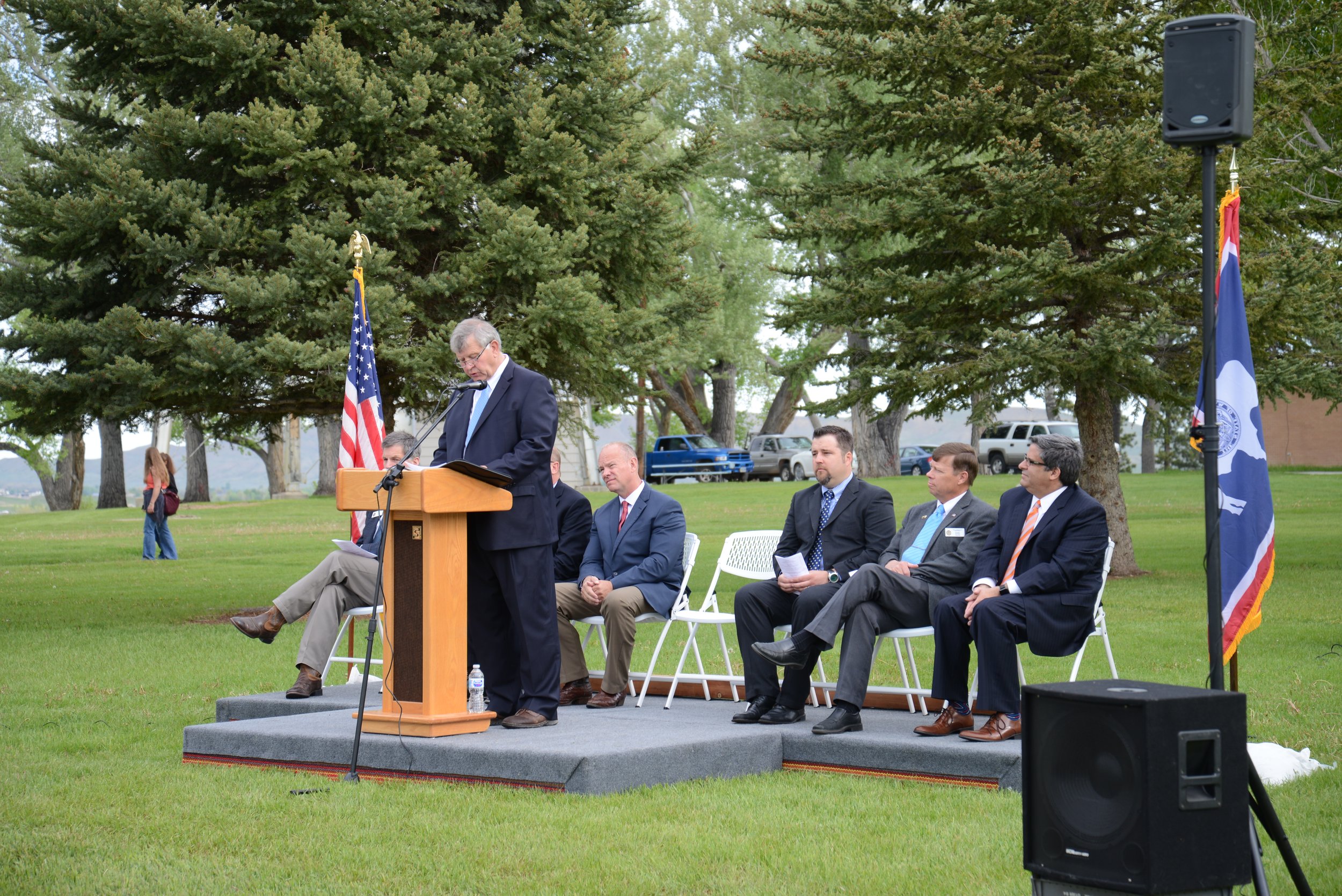I have been consistent in voting for conservative values, protecting private property, support of reduced regulation, a balanced budget, religious freedom, Second Amendment rights, and pro-life legislation.
Below are my stances on important issues, along with my voting history. I welcome conversations with anyone on these issues.
Small Government
As a member of the Appropriations Committee, I have worked diligently to limit the size of state government. Between 2009 ad 2022, Full Time Employees (FTE) were reduced by 626, with significant reductions beginning in 2017 when I joined the committee.
We made another 495 FTE cuts between 2022 and 2024. While these are a significant reduction in the size of government, we have worked closely with agencies to adjust these numbers to make sure they have enough employees for things like energy permitting, child protective services, and workforce development.
Responsible Budgeting
Unlike the Federal Government, Wyoming is constitutionally required to have a balanced budget. The state budget, passed by the legislature, appropriates funding for the next two years. While federal spending is unsustainable, Wyoming lives within its means, sets aside savings for future financial challenges, and invests to supplement state income.
As the House Vice Chairman of the Appropriations Committee, I helped develop budgets during the state's most challenging revenue periods. In 2017, after the 2016 downturn, and in 2021, we made 15% cuts across three budget steps.
In 2024, our State General Fund appropriations were $3.7 billion, a figure relatively unchanged in the past 15+ years despite inflation. Adjusted for inflation, the 2007-2008 budget of $3.65 billion would equate to $5.7 billion today. This lack of budget growth represents practical spending reductions grounded in Wyoming's conservative values. All the while we have ensured vital services, increased savings, and reduced General Fund spending over the last 15 years. The federal government could learn from Wyoming's approach.
Property Taxes
High property taxes in Wyoming are a result of people moving in from states like California and Texas, willing to pay above asking prices. To address this, I supported several property tax bills:
HB0004: Increase and restructure the property tax refund program
SF0089: Increase the property tax exemption for veterans
HB0003: Provide a property tax exemption for long-term homeowners
HB0045: Cap annual property tax increases
HB0134: Amend the tax deferral program
HB0203: Create a new property tax system with sales tax
Local government and school representation are crucial in finding solutions, as property taxes fund schools and local governments, not state operations.
I also support SEJR003, a constitutional amendment proposal to create a separate class for residential and commercial property taxes, providing significant relief to those most affected by rising real estate demand.
Energy
Energy is Wyoming's economic backbone, providing jobs and revenue through royalties, severance tax, and sales tax. The future holds incredible possibilities with rising global demand for Wyoming's energy and minerals. However, challenges include new restrictions on federal land leases and emissions restrictions.
With 35 years of experience in the petroleum industry and legislative service on the Minerals and Appropriations committees, I understand the needs of extractive industries. I've amended budgets to fund the Energy Authority to protect Wyoming’s coal producers.
In 2023, I sponsored HB0063, allocating $1.3 million to litigate against coal-fired facility closures. I opposed a budget amendment to reduce energy matching funds vital for projects like the new nickel discovery in Fremont County and BWXT's small nuclear reactors. My advocacy for energy and mineral industries has earned endorsements from the Petroleum Association of Wyoming and the Wyoming Mining Association.
Education
I support reducing K-12 testing and applaud Superintendent Megan Degenfelder's new policy to focus more on teaching. I advocate for local control of schools through elected school boards to reflect diverse community perspectives.
In 2020, I opposed legislative restrictions on school boards' authority to set vaccine requirements, believing in local decision-making. Schools must serve parents, who should be engaged in their children's education, and educators must keep parents informed. This is why I voted for SF0009, "Parental rights in education-1."
Emergency Medical Services (EMS)
EMS, or ambulance service, faces significant challenges statewide, including Fremont County. As EMS is not considered an essential service, its provision and funding vary widely, managed by hospitals, cities, or counties.
Some advocate for state-provided and funded ambulance services, but I oppose expanding state government for this. I believe in local control; communities should fund their EMS if they value it. I co-sponsored SF0043, allowing county commissions to create EMS districts with governing boards to recommend mill levies for funding, subject to voter approval.
Healthcare
Wyoming, like Alaska, is considered "Frontier" rather than "Rural" due to its low population. Providing affordable healthcare here is challenging but critical for stability and growth. Key issues include:
Hospital Stress
Every community desires local healthcare, ideally with a hospital offering OB, emergency, and surgical services. However, the small population base struggles to support these costs, leading residents to seek cheaper out-of-state care, stressing local hospitals. We need a system ensuring essential services statewide.
Mental Health
I have led efforts to redesign our behavioral health system to prioritize state funding for those most in need. As Chairman of the Mental Health Task Force, we are developing pilot programs and policies to:
Provide services in K-12 schools
Establish a temporary safety net for adolescents with high behavioral needs
Divert misdemeanants with mental health issues to treatment instead of jail
Enhance services for vulnerable adults with aging-related mental health challenges
Capital Construction
When a new public building in the state is built, whether it be at a community college, a K-12 school, a new state office building or state hospital, the state pays in cash. The state does not borrow money to build and are one of a few states that can say that. My role on the Appropriations committee is to ensure new buildings are warranted and are funded before we bid.



